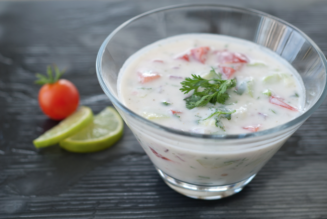Food As Medicine: The Eight Important Aspects Of Food
According to Ayurveda, food is considered to be the best medicine. Of equal importance is the consideration, according to Ayurveda, that poor digestion [koshtha] is the primary origin or causative factor for nearly all diseases.
“Ahara Vidhi Visheshayatana”
The Eight Important Aspects Of Food:
Let’s discuss the basic principles of food. The eight important aspects of food are called ‘ahara vidhi visheshayatana’ and they are as follows:
1. Prakruti
2. Karana
3. Samayoga
4. Rashi
5. Desha
6. Kala
7. Upayoga Samasth
8. Upbhokta
A Closer Look:
1. Prakruti – or the nature of food
Depending on whether the food is easily digestible or not, food can be classified as heavy or light in quality. Meat is heavy for digestion while rice and vegetables are light. This is the basic nature of the food and while eating we must take this into consideration.
2. Karana – or processing
Generally, cooked food is better for nutrition. Some food substances like fruit or even salads are better taken as uncooked. Food cooked on natural wood or a coal fire tends to have better taste than food cooked with electricity or gas. Microwave cooking destroys prana [life-energy] in the food. Processing includes other methods like roasting, frying, baking, drying, churning etc. and depending on the method of the process can actually change the qualities of the food making food either become more light or heavy for digestion.
3. Samyoga – means combination
While preparing food the ingredients must be compatible and properly mixed together. For example, combining sour fruits with milk will curd and is not considered beneficial due to poor food combining and incompatibity of ingredients.
4. Rashi- means quantity
While eating one has to consider the individual ingredient quantity and the total quantity of the food that is consumed. Here, again, we have to consider the heavy and light qualities of the substances that are taken. The quantity of food depends on your digestive fire. There is no fixed criteria for the amount of food according to age, sex, race, etc. However, “parigraha”— takes into consideration the quantity of each item and “sarvagraha” means the total quantity to be consumed.
5. Desha – means place
Ayurveda has divided place into three types marshy, arid, and normal. We also have to consider the place in relation to temperature and cold climate conditions. Ultimately, food must be eaten in a place which is clean. If the surroundings where one eats are good and sattvic [pure], then the food is better absorbed and has good and beneficial effects upon the body and mind.
6. Kala – means time or period
Only when the previous meal has been properly digested should one consider eating the next meal. One must also change the type of food as well as the quantity and quality of food in accordance to seasonal changes. Another important consideration is that the main meal ideally should be taken between 10 a.m. to 2 p.m., which is “pitta time”; optimal for digestion.
7. Upyoga Samastha – means rules for eating
Food ideally should be consumed while it is hot. This will naturally increase the digestive fire. Likewise, meals must be taken in a relaxed, calm and cheerful atmosphere. One should not eat, when the person is nervous, angry, anxious, or in a disturbed state of mind.
Similarly, eating too slowly or too rapidly along with eating while talking, laughing, thinking or watching television is also not advisable. It is better if we concentrate on the food only with the thought that this food is going to benefit both the body and mind. Smoking or drinking too much water or any other liquid after eating is also not advisable.
Make eating food a ritual
It is recommended to take a shower and wear clean clothes prior to cooking. Our guest is God. Therefore, food should first be served to him and then children. Chanting of mantras and offering a prayer to God is always advisable knowing that blessed food will always nourish both the body and mind.
8. Upbhokta – Person who takes the food
Every person must take into consideration his own constitution, capacity of his digestive power, the season, time of day, and whether the previously taken food has been digested or not.
Written by Dr.Gaurang Joshi
https://www.atharvaayurvedindia.com
Twiiter @drgaurangjoshi




![Female Health: Amenorrhea [cessation of menses] – An Ayurvedic Perspective](https://healthyayurveda.com/wp-content/uploads/2015/07/1.-Amenorhea--327x219.png)




